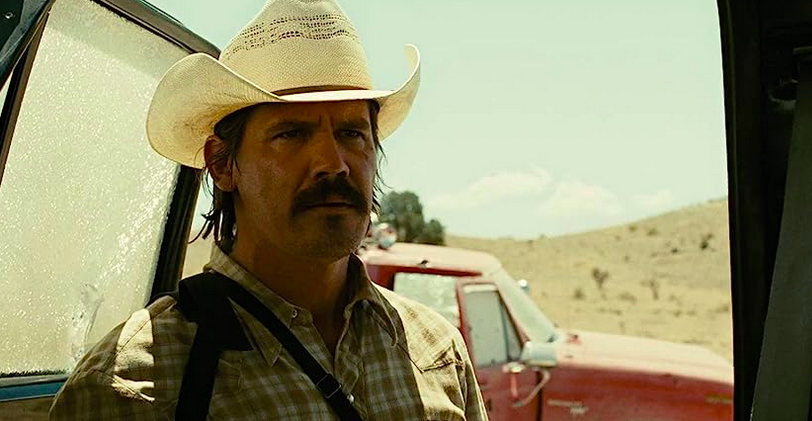No Country For Old Men (dir. The Coen Brothers, 2007) — Review
Read the No Country For Old Men script here — for personal, private and educational use only.
Based on the novel by Cormac McCarthy, No Country for Old Men is part crime film, part glassy-eyed stare into the void. A meditation on chance, destiny, old age and those darn whippersnappers of the modern day, the film draws on the lurid natural contours of the Texas mesa, along with the austere pace of the book. Far more laconic than the Coens’ earlier comedies, the neo-noir drifts between 1980 and an imagined American past — the real ‘back in the day’ of the frontier spirit and World War II — with only a few twinges of music to distract from its grisly, naturalistic soundscape of blaring telephones, rocks crunched underfoot, and machine gun fire. "I was sheriff of this county when I was 25 years old," begins grizzled Ed Tom Bell (Tommy Lee Jones), reminiscing about friendlier days when some lawmen didn't even carry guns. "I don't want to push my chips in and go out and meet something I don't understand."
We meet just such a ‘something’ moments later, when Anton Chigurh (Javier Bardem), a dead-eyed drifter with a psychotic Beatles mop-top, strangles an unfortunate young patrolman to death, helps himself to a police cruiser and proceeds to punch a hole in a passing motorist’s forehead with one of cinema’s all-time historic creepy smiles. With no explanation for this almost alien encounter — set in an unidentifiable desert that could be 1880 or 1980 — we next encounter Llewelyn Moss (Josh Brolin), another hunter addressing his prey over the rifle barrel. Moss misses his antelope but finds something else: a collection of bullet-ridden trucks and bodies, remnants of a drug deal gone badly wrong, and — oh yes — a briefcase containing two million dollars. Moss decides to take it, and his die is cast. As he later explains to his wife, Carla Jean (Kelly Macdonald), "Baby, things happen. I can't take 'em back."
From here, the film unfolds as a chase, though one conducted at a measured Texan lope rather than the mad scramble of a typical crime thriller. Moss hits the road with his case full of cash, and Chigurh is hired to find him, along with an array of disposable Mexican enforcers and a dandyish, Stetson-topped cowboy named Carson Wells (Woody Harrelson). Jones's avuncular Sheriff Bell hopes to track Moss down, too, rather sweetly set on intervening before Chigurh catches him first.
Amidst this shambolic scramble for ill-gotten gains, Bardem’s Chigurgh — the unstoppable evil of the piece — wields a diabolical intelligence alongside his tools of murder. With a bowl cut acting as his hood, an all-black denim fit and a cattle gun instead for a scythe, Javier Bardem’s Chigurh is Death personified, simultaneously a blunt instrument and a philosophical ideal. Just as in McCarthy's highly cinematic novel — which omits punctuation, in his trademark no-frills depiction of the state of nature — the tone of the movie is uncanny and apocalyptic, with Chigurh’s sharklike invincibility and twisted moral code illuminating the decay of his ‘normal’ fellow characters. The Coens' adaptation omits the details of Ed Tom's experiences in the second world war and hence his musings on the hollowness of heroism, but this and the absence of a young female drifter who Llewellyn tangles with in the book intensify the motiveless, disoriented quality of the action. The Coens stay true to the pessimistic severity of the book's ending, with a little more space and audience discretion given to Moss’s wife (MacDonald putting in an excellent shift as a wayward Texan, after her breakout role as a wayward Glaswegian in Trainspotting).
The savoury, serio-comic tang of the Coens' filmmaking surfaces in the moments of black comedy as Chigurh squares up to the local Texas bureaucracy — one of the only characters to best him is a stout, cranky middle-aged receptionist — as does their predilection for the weirdness of hotels and motels. But in McCarthy's novel they benefit from a tangible gravity, a sense that their offbeat Americana and gruesome comic contortions can add up to a serious statement. And while their trademark flourishes still appear — the meticulous compositions (a pickup on a hill silhouetted against the night sky), the ominously amplified sounds (a candy wrapper uncrinkling, a light bulb being unscrewed), the snatches of absurdist dialogue ("You get a lot of people who come in here with no clothes on?" / "No, it's unusual.") — they are anchored to something weightier.
McCarthy's ferocious tale gives the Coens room to unleash their cinematic gifts, but keeps them from wandering too far afield and losing themselves in easy irony. Like the novel, the film ends on one of these moments, with the recounting of a dream. It is a dream about death, but a death more welcoming than feared. "You can't stop what's coming," Harrelson’s character advises late in the film, and indeed there's only one thing that comes for all of us.




